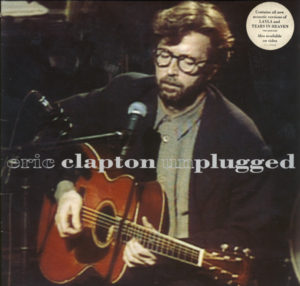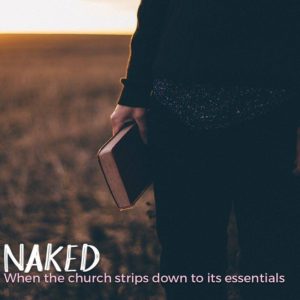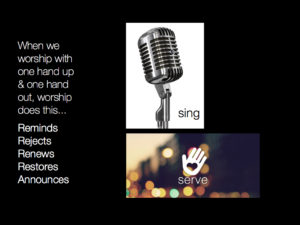by Jonathan Manafo | Sep 27, 2017 | Sunday Conversations
 In the early 90’s (ya, ya, I’m dating myself) I really started to get into the music of Eric Clapton. He had been a guitar legend for many years. But in the 90s he came out with a record titled ‘unplugged’. Clapton took a bunch of his songs, stripped them down, and performed them acoustically. Tears in heaven might’ve been my favourite, plus a few other blues tunes he did. This was part of a wider movement of artists who began recording and performing their songs with less tracks, less effects, less noise, and simple arrangements and instrumentation. Some people might say that when we hear a song ‘unplugged’ we get to the heart of the song a little more. It allows the song to breathe.
In the early 90’s (ya, ya, I’m dating myself) I really started to get into the music of Eric Clapton. He had been a guitar legend for many years. But in the 90s he came out with a record titled ‘unplugged’. Clapton took a bunch of his songs, stripped them down, and performed them acoustically. Tears in heaven might’ve been my favourite, plus a few other blues tunes he did. This was part of a wider movement of artists who began recording and performing their songs with less tracks, less effects, less noise, and simple arrangements and instrumentation. Some people might say that when we hear a song ‘unplugged’ we get to the heart of the song a little more. It allows the song to breathe.
Last week we started a series that could’ve easily been called UNPLUGGED. Instead we called it NAKED. A little more edgy, I know, but it really communicates something. We want to strip down to what’s important, to the heart of what the church is, and also what has brought the church to this point in history.
 Last week we talked about The TABLE. The communion table, Eucharist. We were reminded that this table is set before us to remember Jesus sacrifice, but it’s also here to be an example to the world of a better way, a way of unity, and grace, and hospitality. (check out our recap online)
Last week we talked about The TABLE. The communion table, Eucharist. We were reminded that this table is set before us to remember Jesus sacrifice, but it’s also here to be an example to the world of a better way, a way of unity, and grace, and hospitality. (check out our recap online)
This week we talk about another essential, using another image. Well, two images if you will – a microphone and a towel. These two things together help us understand why worship is essential to the church’s past, present and future.
What do I mean when I say worship? Well…it means different things for different people.
- for some it’s tradition
- for some it’s music, singing, and creative production
- for some it’s liturgy
- for some it’s all about the TABLE
- for some it’s not about any of these things, instead it’s only about what they do in the world, every day, to make difference in the things they touch.
Honestly, it’s all these things and more.
Know this…
To worship is human
To give something worth is at the core of how we make decisions
To acknowledge that you value or love something is at the heart of our personalities and humanness
You might say it like this, “You are what you love” “You are what you value” “You are what you worship”
Think about this: If we are what we love and we love what we worship, than we are what we worship! That might change the conversation for you?
Through out biblical history and through out church history, worship has been and continues to be, an essential. Worship happens through song, liturgy, prayers, action, serving, hospitality, and really through everything we do. At its core, worship is what we give value to, what we view as God in our life, who or what we bow to or give our time to or invest our money in.
We get started in the OT with a certain kind of language or narrative.
There is a constant comparison of GOD vs gods. Will you worship Yahweh, the living God or some small ‘g’ god that is as good as dead? The language is plain and simple, black and white at times.
God, Israel’s God, is ALIVE. Other gods are, well, dead. ONE can help, heal, deliver, protect, provide, be present, etc. The ‘others’…they can’t do any of those things.
We get one of our first glimpses into this, in Exodus 20, (part of the 10 commandments) You will have no other God before me. Exodus 34:14 says this, “Do not worship any other god, for the Lord, whose name is Jealous, is a jealous God.” Jealous is a relational term. We see this kind of language in many of the prophets. (Almost like God is telling Israel to be a one man woman)
What we also read from the OT writers is a comparison of a God who made us and god(s) who we made. See the difference? One made us, the others were made by us!
Another prominent theme in the OT is that worship is not just about what you say, or sing or read or pray, but where your heart is found.
“These people come near to me with their mouth
and honor me with their lips,
but their hearts are far from me.
Their worship of me
is based on merely human rules they have been taught. (Isa 29)
Not just lips, but life / Not just words, but heart / Not just acknowledgement, but action
So even early in the biblical narrative, worship is not only important, but it’s bigger and broader than most people understand it to be.
Worship asks us the big question? What do you value, what do you deem worthy of your attention, your feelings, your time, your heart? What or who is it that you love? Because we are what we love – and therefore, we are what we worship. (this is a discussion all on it’s own)
The N.T. story around worship…
As usual, Jesus expands, and brings to completion, what the O.T. started. We’re only going to look at one place, Mark 12. Jesus is asked by Pharisees and Religious teachers, what is the most important of all the commandments (613 of them)? This is how he responds…
(quoting both Deuteronomy & Leviticus)
“The most important one,” answered Jesus, “is this: ‘Hear, O Israel: The Lord our God, the Lord is one. Love the Lord your God with all your heart and with all your soul and with all your mind and with all your strength.’The second is this: ‘Love your neighbour as yourself.’ There is no commandment greater than these.” (29-31)
Have you ever thought about what you’d do if your home as on fire? What would you take, if you could take anything? What would you grab as you escaped?
- children (of course)
- wallet, computer, passport, will (wise)
- your favourite watch (if you have time)
- one guitar…or two…or 3 (I leave one my the entrance in case)
These things are more valuable than furniture, TVs and clothing. Right? By identifying those things, you discover where you priorities lie.
This question Jesus is asked, even though it’s about commandments or laws, is really about worship.
3 things about this text that helps us understand worship a little more…
- Acknowledge God
- Love God
- Love others
Jesus says, essentially, I’m going unplug the loud speakers and the remove the layers. I’m going to strip away the stuff that doesn’t mean as much. Here’s the bottom line. Worship is about recognizing who God is, Loving him, and loving the people he created.
If it ever becomes about more or less than that, we have it wrong.
Jesus teaches us the posture of worship:
ONE hand UP
ONE hand OUT
Worship is never about a place (church building) and position or pizzazz, it’s about posture!
Remember…if we are what we love and we love what we worship, than we are what we worship!
TAKE HOME:
So why do we sing songs then? Together? in gatherings all around the world? Well, there is some biblical evidence and inspiration for that, but let’s look at a cultural reason.
If you’ve watched the movie La La Land, you may have noticed that there is one song that is prominent through out. The movie starts with a broadway-esque version, loud, lots of people, lots of instruments. However, through out the movie, you here many different versions of the same song. Soft, slow, simple, jazz trio, just piano, just melody. Why? The writers are bringing us back to the theme of the movie. The song, repeated, reminds the audience of the main story, intertwined, weaved through, the many scenes of the movie.
That’s why we sing songs on Sunday. They bring us back to the story of Jesus. And give us a vehicle/instrument to worship – to say, God, you’re my God, and I won’t let other ‘g’ods take my attention.
But of course, worship doesn’t only happen in song, but with life and action and everyday stuff. Sing to God & Serve your neighbour. That’s the fulness of what it means to worship!

Worship…
- Reflects (the story of Jesus)
- Reminds (us of his love and grace)
- Rejects (the ‘g’ods in our world)
- Renews (our hearts and minds)
- Restores (our brokenness)
- Announces (the gospel story, the biblical narrative that leads us to Jesus, who said, to Love God fully, and Love our neighbour as we love ourself)
by Jonathan Manafo | Sep 19, 2017 | Sunday Conversations
We are entering a season of layers. Clothing layers that is. When the cooler weather rolls in we begin to think about what else to put on, what else to wear, instead of simple shorts and t-shirt. Like me, you probably know some die hards who will wear their shorts all year round. You know the ones…you see them taking out the garbage in the middle of winter with flip flops on. I get it, to some degree, because it’s just easier to think about when getting dressed. Other than the essentials that we wear, everything else is layers. Layer uponlayer.
The local church, at times, may have gotten caught up in the layers, and by doing so, it’s easy to forget about the essentials. Nothing is wrong with layers, both in our wardrobe and in our churches, but let’s not forget what keeps us snug and kept together.
 For the next few weeks we’ll be talking about the Hanes, Fruit of the Loom, and Calvin Klein of the local church. I love the layers we creatively add to advance the gospel, but whe
For the next few weeks we’ll be talking about the Hanes, Fruit of the Loom, and Calvin Klein of the local church. I love the layers we creatively add to advance the gospel, but whe
n it comes down to it, there are a few essentials…it’s those things that we’ll be stripping down to and talking about.
The Table / Microphone / Coles Notes / Bull Horn. I know, they don’t sound foundational, but they are.
First up. The Table.
We all love what cell phones do, don’t we. We appreciate the time they save us and the tools they offer. But one thing they also do is take us away from spending quality time with people. If you’re not careful, when out with friends, you may spend as much or more time on your smart phone than you do with actual living and breathing people. We have a little rule in our family and home. When we get to the kitchen table we are not allowed to have any cell phones within reach. If we sit down and they’re in our pocket, we have to get up and place it somewhere out of reach. Why? Here’s why – The Table is where people come together.
Depending on where you come from, you may have fond memories of your kitchen table…or you may want to forget the experiences around that table or the lack thereof. It’s intention, if used well, is for those who live in a home to come together and share a meal.
 If you’ve skimmed through the scriptures you’ve noticed that food, meals, banquets, and tables are very important to the biblical narrative. They are metaphors for community, faith sharing, friendship, grace, and with the Lord’s supper, sacrifice. The prodigal son’s story ends with a banquet. Jesus invites us to a big dinner party. Jesus is accused of eating with sinners, and his final act with his disciples is a meal.
If you’ve skimmed through the scriptures you’ve noticed that food, meals, banquets, and tables are very important to the biblical narrative. They are metaphors for community, faith sharing, friendship, grace, and with the Lord’s supper, sacrifice. The prodigal son’s story ends with a banquet. Jesus invites us to a big dinner party. Jesus is accused of eating with sinners, and his final act with his disciples is a meal.
I’d like us to look at two places. One very quickly, and the other a little more in depth.
In Luke 24:30-32, after his resurrection, Jesus sits with his disciples, who still don’t recognize him. This is what we read…
When he was at the table with them, he took bread, gave thanks, broke it and began to give it to them. Then their eyes were opened and they recognized him,and he disappeared from their sight. They asked each other, “Were not our hearts burning within us while he talked with us on the road and opened the Scriptures to us?”
My favourite thing about this story is that when Jesus breaks the bread, they recognize him. When he prepares the food, they see him, when they sit at the table, ready to eat, they realize that He is in fact, Jesus, their resurrected friend and saviour.
Why is the table so essential? Because at the table is where we see Jesus…for who he is…for what he’s done, for what he can still do, in and through us. It’s also at the Table, where we can truly see each other and be in community with others.
By the Table, we’re talking about communion, the Lord’s supper, Eucharist.
It’s Paul who brings light to how powerful and significant the Lord’s supper is. The scripture we read almost every time we share wine & bread is found in 1 Corinthians 11:23-26. It’s here that Paul recalls Jesus’ words from the last supper…
For I received from the Lord what I also passed on to you: The Lord Jesus, on the night he was betrayed, took bread, and when he had given thanks, he broke it and said, “This is my body, which is for you; do this in remembrance of me.” In the same way, after supper he took the cup, saying, “This cup is the new covenant in my blood; do this, whenever you drink it, in remembrance of me.” For whenever you eat this bread and drink this cup, you proclaim the Lord’s death until he comes.
Paul tells us that he received this from Jesus, and he’s passing it on to us. It’s a moment that Jesus wanted us to remember, and also repeat. Of all the things Jesus chooses for us to remember him by, it’s a meal…something we eat around a table…food. He could’ve said something impressive or mystical…or spiritual. But that’s the beauty of this…it’s so simple.
Jesus picks the most ordinary of acts and ordinary of foods: Bread & Wine. Simple, yet significant.
We are reminded of Jesus gift to us – his life and his death. His love and his sacrifice.
How do we remember this gift? By receiving a meal and by gathering around a table and by doing it on a regular basis…so we don’t forget.
But what about the parts of this text we don’t read too often? (11:17-22)
In the following directives I have no praise for you, for your meetings do more harm than good. In the first place, I hear that when you come together as a church, there are divisions among you, and to some extent I believe it. No doubt there have to be differences among you to show which of you have God’s approval. So then, when you come together, it is not the Lord’s Supper you eat, for when you are eating, some of you go ahead with your own private suppers. As a result, one person remains hungry and another gets drunk. Don’t you have homes to eat and drink in? Or do you despise the church of God by humiliating those who have nothing? What shall I say to you? Shall I praise you? Certainly not in this matter!
Before Paul gets to Jesus’ words, he shares his concern with the Corinthians. Tough words. I have no praise for you / You’re doing more harm than good / Divisions / verse 19 is a sarcastic phrase “You’ll wanna make sure the important people stand out” (NTW)
He’s saying that if this is your attitude when you come together, when you receive the Lord’s meal, then it’s not the Lord’s meal you’re eating!!!
This is how vital and central this meal was to our faith and to the church – they had to get it right!!!
Paul continues to share his concerns…if you’re not going to share, you might as well be eating alone…somebody is hungry and another is full.
Know that Paul is also referring to the larger meal that surrounded the Eucharist meal. There was lots of food at this meal…potluck style, but the problem is they weren’t sharing. Not good. Not right. Not reflecting of what this meal is about.
As much as communion is about remembering & proclaiming Jesus’ death, it is also about being grateful and treating others as yourself. Eucharist, after all, means thanksgiving.
The Lord’s table must always be a place where the playing felid is levelled! Bringing rich & poor together, not to mention other diverse people!
Here are a few things we wanna take home…
Did you notice a few years back that Starbucks introduced a community table in their cafes? They intentionally removed some of the small, mostly two-person tables and added a table that fits 6, 8, or 10 people. Why? They wanted to encourage community. They figured that people are in need of community, and they would at least make an attempt to fill that need. Every time I see one of those tables I’m reminded of the Kingdom of Heaven. I wanna be one of those people who identify’s Kingdom values in everyday spaces. Big Tables filled with people are one of them!
Why is a TABLE essential in our understanding of the church?
– a table isn’t a structure that keeps people out, but a space that invites people in
– tables are welcoming
– tables are inviting
– tables are communal
– tables are for family…or friends who feel like family…or people who end up feeling like family after sitting at a table together for a while…
– THE WORLD needs this TABLE as much today as it ever does…
&
– the communion table reflects and projects: thanksgiving, community, faith, sacrifice, love, openness, hope, food, joy, satisfaction, …
So when you strip away the layers, this table, the Lord’s table, is one of our essentials that we can’t live without.
 In the early 90’s (ya, ya, I’m dating myself) I really started to get into the music of Eric Clapton. He had been a guitar legend for many years. But in the 90s he came out with a record titled ‘unplugged’. Clapton took a bunch of his songs, stripped them down, and performed them acoustically. Tears in heaven might’ve been my favourite, plus a few other blues tunes he did. This was part of a wider movement of artists who began recording and performing their songs with less tracks, less effects, less noise, and simple arrangements and instrumentation. Some people might say that when we hear a song ‘unplugged’ we get to the heart of the song a little more. It allows the song to breathe.
In the early 90’s (ya, ya, I’m dating myself) I really started to get into the music of Eric Clapton. He had been a guitar legend for many years. But in the 90s he came out with a record titled ‘unplugged’. Clapton took a bunch of his songs, stripped them down, and performed them acoustically. Tears in heaven might’ve been my favourite, plus a few other blues tunes he did. This was part of a wider movement of artists who began recording and performing their songs with less tracks, less effects, less noise, and simple arrangements and instrumentation. Some people might say that when we hear a song ‘unplugged’ we get to the heart of the song a little more. It allows the song to breathe. Last week we talked about The TABLE. The communion table, Eucharist. We were reminded that this table is set before us to remember Jesus sacrifice, but it’s also here to be an example to the world of a better way, a way of unity, and grace, and hospitality. (check out our recap online)
Last week we talked about The TABLE. The communion table, Eucharist. We were reminded that this table is set before us to remember Jesus sacrifice, but it’s also here to be an example to the world of a better way, a way of unity, and grace, and hospitality. (check out our recap online)

 For the next few weeks we’ll be talking about the Hanes, Fruit of the Loom, and Calvin Klein of the local church. I love the layers we creatively add to advance the gospel, but whe
For the next few weeks we’ll be talking about the Hanes, Fruit of the Loom, and Calvin Klein of the local church. I love the layers we creatively add to advance the gospel, but whe